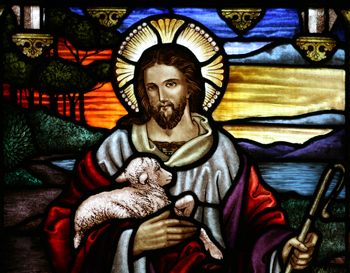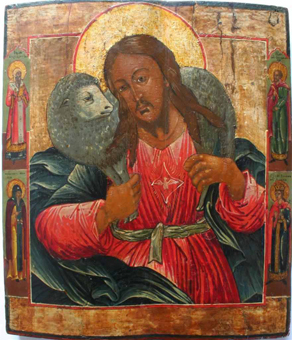For Sunday April 22, 2018
Lectionary Readings (Revised Common Lectionary, Year B)
Acts 4:5-12
Psalm 23
1 John 3:16-24
John 10:11-18
If you grew up in the Church, you learned that Jesus is the Good Shepherd before you could walk or talk. Maybe there was a painting in your church nursery, of a gentle-faced Jesus wearing flowy robes, an adorable lamb perched on his shoulders. Maybe you made flocks of sheep out of tooth picks, cotton balls, and Elmer's glue in Sunday School, or had a teacher who moved a felt-and-Sharpie shepherd across pine green flannelgraph — while you waited for the wolf to show up and make the story interesting. If you’re a preacher’s kid like me, maybe your clergy parent made you sing, "I Just Wanna Be a Sheep, Baaa Baaa," until you were old enough to flinch in embarrassment and beg for mercy.
In other words, I don’t think I’m the only one who finds the Good Shepherd passages in John's Gospel difficult. The metaphor is overfamiliar, its beauty buried under so much saccharine piety and Hallmark card sentiment, it’s hard not to roll our eyes. Most of us in the 21st century have no real-life idea what Jesus was talking about when he described the life of faith in terms of shepherds, sheep, hirelings, and wolves. The images we hold in our heads aren’t substantive and gritty; they’re ephemeral and soft, like watercolor pastels.
The thing is, Jesus was an effective teacher because he used metaphors his audience could relate to. When he spoke of sheepfolds, vineyards, mustard seeds, and fishing nets, he was not spouting exotica; he was wielding the stuff of first-century peasant life. So the problem isn’t Jesus, it’s me: I've never herded sheep, met a shepherd, or fought a wild predator in my life.
 |
But I did grow up visiting my grandparents' farms in India, and I can tell you this: I never saw my grandfather drape a baby animal over his clean, robed shoulders. Most of the time, the animals on his farm stank. Often, at the end of a long day in their midst, so did he. How the Church went from the mud-stained hardships of animal husbandry to a manicured Jesus cuddling a lily-white lamb, is beyond me.
So I come to this week's readings jaded on the one hand, and ignorant on the other. What did Jesus mean when he called himself the good shepherd? In what ways am I like a sheep? What flock do I belong to, and whose voice do I follow most readily? I don’t have black-and-white answers. What I have are questions — and an ongoing desire to re-engage and recover this metaphor in my own life. As I read and reread John’s Gospel, here are some of those questions:
Why did Jesus use a shepherd metaphor in the time and place he did? According to the Gospel reading, Jesus had just healed a blind man on the Sabbath, and the religious elite were furious. Moreover, it was the Feast of the Dedication (the holiday we know today as Hanukkah, when Jewish people celebrate the rededication of the Temple after the victory of Judas Maccabeus in 2nd century BCE), and Jesus was walking in the Temple itself — the very place the Jews venerated as representative of their unique, covenantal relationship with God.
Why call himself a shepherd in that setting? The image of a shepherd tending his flock would have been deeply ingrained in the religious imaginations of the Israelites. They knew Moses tended his father-in-law's flock before God commissioned him to lead the Israelites out of slavery. They knew King David tended sheep before ascending to the throne. They knew Yahweh as the ultimate Shepherd over his flock, Israel.
So I wonder if Jesus was saying something provocative rather than self-effacing when he called himself the Good Shepherd. I tend to think "meek and mild" when I imagine Jesus cradling lambs, but why would meek and mild incense his listeners, who attempted to arrest him for using this particular metaphor? Was Jesus in fact equating himself with God, the Shepherd King?
On the very occasion when the Jews were celebrating the supremacy of the Temple, and its centrality in their religious lives, was Jesus suggesting that God's presence actually dwells in the wilderness, out among the wolves, the thieves, the hirelings, and the smelly sheep? (In other words, among the outcasts, the irreligious, the ritually unclean, and the politically incorrect?) If so, what might this provocative teaching mean for us today? Where is my Temple? Where is my wilderness? Where are the places I assume God doesn’t dwell?
 |
What did Jesus mean when he said, "I know my own and my own know me." Is the life of faith really so straightforward, so certain? I'm remembering times in my life when I have not known for sure who God is or what he desires of me. When I've feared that I am not Jesus' own. If Jesus is so certain of my identity, so sure that I'm capable of discerning his voice, I wonder what keeps me hanging in doubt and fear.
I think of the barriers that lie between Jesus' assurance and my faith. There are barriers of doctrine. (Do I believe all the right things about God? Do I have my creeds in order? Is there some nuance of theology I'm missing?) There are barriers of guilt. (How can I really be forgiven when I mess up so often? If I belong to the shepherd, why is it so easy to wander away? Surely there must be a catch somewhere.) And there are barriers of pain. (I've cried out for my Shepherd's voice many times, and experienced silence. Or if Jesus has spoken, I have not recognized him.)
If the metaphor isn't perfect, or if it leaves much to mystery, can I still find the courage to lean into it? Maybe the “barriers” I’ve named are of my own making. Maybe what Jesus is saying in this passage is more straightforward and more radical: You belong. Yes, you do. Yes, you do. I know you. You are mine. Period.
Who are my modern-day hirelings? In the story Jesus tells, the hired hands are pseudo-shepherds who work for personal gain, not love. They have no stake in the well-being of the sheep; they flee at the first sign of danger. So I wonder: whose voices do I heed to my detriment? What siren songs call to me, making seductive promises I shouldn't trust? Money? Success? Physical attractiveness? Prestige? Politics? Racial, cultural, or national identity? These are the biggies, easiest to name. What else calls to me, promising a version of love that is ultimately thin, cheap, and unsafe?
What is shepherding really like for Jesus? I've heard that sheep are dumb and skittish. I've heard they wander, get hurt easily, graze without ceasing, and bicker for no decent reason. I've heard they're stubborn, that they long to be led, but resist being driven. So I wonder what Jesus has to put up with, shepherding me. Does he fight loneliness and boredom as I ignore him in favor of greener pastures? Does he watch the dumb, skittish, stubborn things I do, hoping I won't injure myself yet again? Maybe he rescues me from death all the time, while I — oblivious — resist his efforts tooth and nail.
| |
Why has the church blunted this metaphor? The more I read John 10, the more gritty and challenging it sounds. I'm astonished at how much I have not seen in this passage. As the Good Shepherd, Jesus lives at the edges of polite society, out in the wild, untamed places of the world. His life remains perpetually in danger. He faces again and again the mockery and abandonment of the hirelings, who consider his self-sacrificial vocation absurd. Because he's in it for the long haul, he not only frolics with lambs, but wrestles with wolves. He not only tends the wounds of his beloved rams and ewes; he buries them when their times come.
No wonder the Church has turned Jesus-the-Shepherd into a greeting card. It's hard to face the bold leader he really is. It hurts to trade the Hallmark card for the long nights and danger-filled days of a vocation in the muck.
So how will we incarnate the love of this magnificent shepherd? How will we spread his goodness in the wildest of wild places? In the valleys, among the wolves, within the flock he knows and loves? What will it take to recover his fortitude, his courage, his boundless love? On this fourth Sunday after Easter, we know that Jesus is a shepherd who keeps his promises: he has already laid down his life for his sheep. Now it’s our turn. Our Shepherd is calling, and his call is trustworthy. But we’re free, now and always, to resist; we follow what we belong to. Is it him?
Image credits: (1) Wikipedia.org; (2) ΑΠΑΝΤΑ ΟΡΘΟΔΟΞΙΑΣ; and (3) Wikipedia.org.





